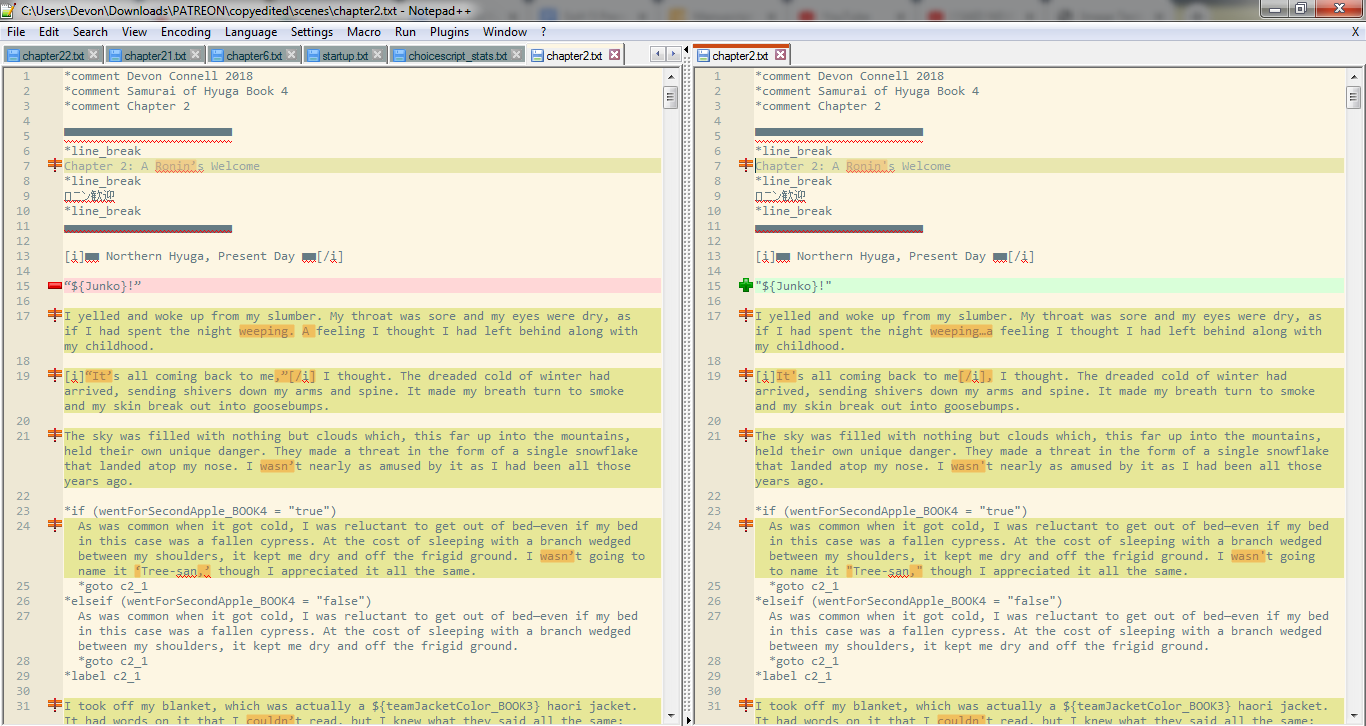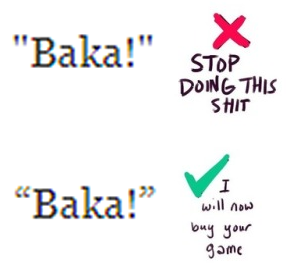Copyediting is a process—for some authors, an ordeal—that is often misunderstood. Whereas editing involves matters of story structure, scene pacing and character elements, copyediting focuses on prose. Copyeditors strive to clarify sentences by fixing spelling and grammar mistakes, cutting down excess words and getting rid of all those, unnecessary, commas.
While compared to the romantically-minded author they may seem more machine than man, copyeditors help reduce reader confusion and offer a pair of fresh eyes over your precious manuscript. That said, they are still human. They have personal conventions, interpretations and “feels” for how each sentence should flow that may not be what you intended. That’s why every author should…
 (Me using the Compare plugin for Notepad++)
(Me using the Compare plugin for Notepad++)
Trust, but Verify
I’d be the first to tell you that I’m an overly protective mother: I don’t trust anybody with my baby, not after spending over a year in hard labor for it. That includes my most recent newborn, Samurai of Hyuga Book 4. If you’re an author worth your salt you’ll go the extra mile and check over each and every change the copyeditor makes. Don’t just do it because you’re afraid they made one mistake while fixing a hundred of yours, but because you’ll learn a ton about your writing while you do so.
I learned enough to inspire me to write up this blog post!
What Went Wrong
Only a handful of things went wrong during the copyediting for Book 4, and they weren’t mistakes so much as differences in conventions. ‘Conventions’ in this case aren’t places to cosplay as catgirls but are standards of style (like etiquette for choicegames). The copyeditor tried to standardize my baby into your typical Choice of Game by getting rid of all the brackets around my [Action Choice]’s and removing the quotes around thought dialogue. “Quite unsettling!” I thought to myself.

But their gravest sin was this: they converted all of my stylized curly quotes in basic, unsightly straight ones! One pair of quotes looks professional and feels like you’re reading a piece of quality literature. The other feels like you’re reading a random html document–I’ll let you decide which is which!
Aside from reverting those changes–and fixing up a comma and a conjunction here and there–the copyeditor did a great job. Read on if you want to know why!
Getting Rid of Words That Don’t Matter
THAT
With the rest of me frozen, my eyes began to close until there was nothing but darkness that remained.
With the rest of me frozen, my eyes began to close until nothing but darkness remained.
OVER
She pointed over to a trail of tracks imprinted over the freshly dusted snow.
She pointed to a trail of tracks imprinted over the freshly dusted snow.
FROM
It was that sort of encouragement that helped me solve the kitsune’s mystery and get Hatch from out of that guillotine.
It was that sort of encouragement that helped me solve the kitsune’s mystery and get Hatch out of that guillotine.
AND
I thought it was a good sign, and so I made the mistake of taking a deep breath and letting out a relaxing sigh.
I thought it was a good sign, so I made the mistake of taking a deep breath and letting out a relaxing sigh.
AS [very common mistake!]
Or at least, my katana did, as the bolt lit up the blade with a heavenly light.
Or at least my katana did—the bolt lit up the blade with a heavenly light.
Simple Is (Almost) Always Better
THOUGHT TO MYSELF < THOUGHT
“I’m better off alone,” I thought to myself.
“I’m better off alone,” I thought.
AS WELL AS < AND
The politician as well as the samurai in him were ready for battle.
The politician and samurai in him were ready for battle.
CAME FORWARD WITH A LUNGE < LUNGED FORWARD
I came forward with a lunge, catching him off guard.
I lunged forward, catching him off guard.
On Commas
(When the subject is introduced, add a comma.)
Upon reaching the top we went prone, edging over quietly to inspect the ruckus below.
Upon reaching the top, we went prone, edging over quietly to inspect the ruckus below.
(No comma needed when using two cumulative adjectives* to describe something)
She had a bed made of hay and a large, cloth covering for use at night.
She had a bed made of hay and a large cloth covering for use at night.
*Cumulative Adjective test: “large and cloth covering” doesn’t make sense = Cumulative Adjectives
In the End
Copyediting is the sort of job I respect yet would never want to do myself. Copyeditors aren’t perfect but your writing isn’t either, and you can learn a lot by looking over their work and understanding how it makes your drivel more clear and concise.
I’m glad I took the extra effort to go over the copyedited version of Book 4, making 100% sure the revised words fit my flow and vision. I recommend every author do the same. But that takes nothing away from the hundreds of corrections and improvements the copyeditor made. If you’re a writer and fortunate enough to have a copyeditor, make sure to thank them for helping your published piece be as professional and readable as it can be!


Recent Comments